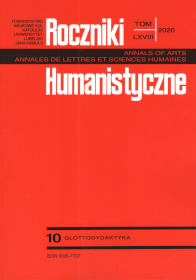Wykorzystanie nowoczesnych technologii w promowaniu samodzielności studentów. Na przykładzie nauczania formalnych zasad sporządzania tłumaczeń poświadczonych zawartych w Kodeksie Zawodowym Tłumacza Przysięgłego
The Use of Modern Technologies in Promoting the independence of students: Based on the Example of Teaching Formal Rules for the Preparation of Certified Translations Contained in the Sworn Translator’s Code
Author(s): Justyna SekułaSubject(s): Language and Literature Studies, Foreign languages learning, Translation Studies
Published by: Towarzystwo Naukowe KUL & Katolicki Uniwersytet Lubelski Jana Pawła II
Summary/Abstract: This paper attempts to undertake a reflection on the validity of teaching the formal guidelines of preparing certified translations during translation classes. The comparative method was used to analyze the legal provisions regarding the profession of a sworn translator in Poland and the manner of conducting the examination for sworn translators, as well as industry documents regarding the preparation of certified translations. The analysis explicitly demonstrated that the knowledge of the formal principles for preparing certified translations is crucial in the context of examinations for sworn translators and preparing certified translations as part of one’s own practice. Furthermore, the author illustrates the method of teaching the formal guidelines for preparing certified translations contained in the Sworn Translator’s Code with the use of modern educational tools, such as Quizlet and Socrative, which represents an alternative to memorization. The author proves that the appropriate use of educational tools during translation classes may support the teaching process at universities and make it more attractive for learners.
Journal: Roczniki Humanistyczne
- Issue Year: 68/2020
- Issue No: 10
- Page Range: 195-206
- Page Count: 12
- Language: Polish

